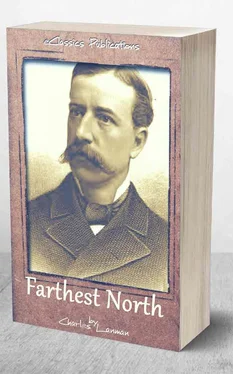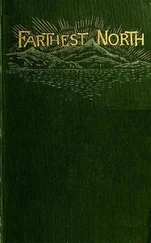Charles Lanman - Farthest North - or, the Life and Explorations of Lieutenant James Booth Lockwood, of the Greely Arctic Expedition
Здесь есть возможность читать онлайн «Charles Lanman - Farthest North - or, the Life and Explorations of Lieutenant James Booth Lockwood, of the Greely Arctic Expedition» — ознакомительный отрывок электронной книги совершенно бесплатно, а после прочтения отрывка купить полную версию. В некоторых случаях можно слушать аудио, скачать через торрент в формате fb2 и присутствует краткое содержание. Жанр: unrecognised, на английском языке. Описание произведения, (предисловие) а так же отзывы посетителей доступны на портале библиотеки ЛибКат.
- Название:Farthest North: or, the Life and Explorations of Lieutenant James Booth Lockwood, of the Greely Arctic Expedition
- Автор:
- Жанр:
- Год:неизвестен
- ISBN:нет данных
- Рейтинг книги:5 / 5. Голосов: 1
-
Избранное:Добавить в избранное
- Отзывы:
-
Ваша оценка:
- 100
- 1
- 2
- 3
- 4
- 5
Farthest North: or, the Life and Explorations of Lieutenant James Booth Lockwood, of the Greely Arctic Expedition: краткое содержание, описание и аннотация
Предлагаем к чтению аннотацию, описание, краткое содержание или предисловие (зависит от того, что написал сам автор книги «Farthest North: or, the Life and Explorations of Lieutenant James Booth Lockwood, of the Greely Arctic Expedition»). Если вы не нашли необходимую информацию о книге — напишите в комментариях, мы постараемся отыскать её.
"Farthest North" by Charles Lanman
Description:
In the 1885 written «Farthest North», Charles Lanman (1819-1895) tells the life story of Lieutenant, and American arctic explorer, James Booth Lockwood, and his deadly participation in the Lady Franklin Bay Expedition, also referred to as the Greely Arctic Expedition.
Farthest North: or, the Life and Explorations of Lieutenant James Booth Lockwood, of the Greely Arctic Expedition — читать онлайн ознакомительный отрывок
Ниже представлен текст книги, разбитый по страницам. Система сохранения места последней прочитанной страницы, позволяет с удобством читать онлайн бесплатно книгу «Farthest North: or, the Life and Explorations of Lieutenant James Booth Lockwood, of the Greely Arctic Expedition», без необходимости каждый раз заново искать на чём Вы остановились. Поставьте закладку, и сможете в любой момент перейти на страницу, на которой закончили чтение.
Интервал:
Закладка:
James Booth Lockwood was the second son and third child of General Henry H. Lockwood and Anna Booth Lockwood. He was born at the Naval Academy, Annapolis, on the 9th of October, 1852, at which time and place his father—a Professor of Mathematics in the Navy—instructed the midshipmen in the military branches, as he had done for many years before. Both his parents were from the State of Delaware, and came from the best stock of that State; and, as his father taught his students “how to shoot,” and prepare themselves for the conflicts of life, it was quite natural that the son should have acquired a love of noble deeds and adventure.
Like many boys, he had his narrow escapes from death, one of which occurred in April, 1860, when, having fallen into the river from the dock, he was rescued in an insensible condition, and restored to life with great difficulty. This escape must have been recalled by him with special emotion in after-years amid his struggles with the ice of Smith’s Sound.
His innate love of fun had been one of his characteristics from childhood, nor was it subdued even when recovering from the accident which nearly cost him his life; for, while lying in his bed, he peered into his father’s face with a quizzical smile, and remarked, “I was drowned, but not drowned dead.”
When the Naval Academy was occupied by a general of the army, in 1861, and the students and professors were transferred to Newport, Rhode Island, young Lockwood accompanied his father and family, and was placed at a public school in that place. After a brief residence in Newport, his father, being a graduate of the Military Academy at West Point, was called upon to command a volunteer regiment of Delaware troops, and having been subsequently commissioned a brigadier-general of volunteers, he was placed in charge of the Eastern Shore counties of Virginia and returned to the region of hostilities, making his headquarters at Drummondtown, in Accomac County. In this quaint and quiet place, and while a mere stripling of ten years, young Lockwood displayed his love of adventure and active life by forming a company of all the colored boys in the village, erecting earthworks in a vacant lot, and, all armed with corn-stalks and broom-handles, meeting a company of white boys in mimic war—noisy, if not dangerous to life or limb. The vanity of personal strife, however, soon becoming irksome to his mind, he turned his attention to horsemanship, and explored the surrounding shores of Accomac on a Chincoteague pony belonging to his father. He also spent many quiet hours conversing about horses and their habits with the soldiers in the garrison, with whom he was a special favorite. After a while, his father was transferred to the command of troops at Harper’s Ferry, and there a new field of adventure occupied the attention of the incipient hero. He was foremost in climbing the neighboring mountain-heights and scaling precipices, and always on the lookout for adventure along the waters of the Potomac. Afterward, when living with his family near the city of Baltimore, he displayed his activity and energy in other ways. When neighboring boys were wont to trespass on his father’s grounds and fruit-trees, he was quite as ready to defend his home as he had been in Accomac to maintain the national struggle then rending the land. And here it was that he often accompanied his father on his rounds among the military works near Baltimore, and always attracted the attention of the troops by his skill in riding. But these experiences were not deemed satisfactory for molding the character of a boy, and then it was that his father sent him to a boarding-school at Bethlehem, in Pennsylvania, kept by a Mr. Schwartz, a good scholar and strict disciplinarian. Of course, like those of all boys, his letters teemed with complaints. He was very homesick—a mere child separated from all he loved. In one letter he spoke of praying to God to make him satisfied. In after-years, and when suffering all the horrors of the Arctic, his mother’s prayer was that his childhood’s star might again arise, and lead his sorrowing heart to that comfort found only above. His chief grievances were a Dutch dish regularly given to the boys, called scrapul, and the discipline of powers administered to those who failed in their studies. In this latter punishment, the delinquent was required to raise to the fortieth, fiftieth, or one hundredth power any number given him. However distasteful to him at the time, he seems to have changed his mind upon the subjects of food and discipline afterward; for he became, after his return home, a strong advocate of scrapul as a physical, and of “powers” as a mental diet. Returning, in 1866, with his father to Annapolis, he was sent to St. John’s College in that place, and at that time in a flourishing condition, under the able administration of James C. Welling, now the accomplished President of Columbian College. Although his mental abilities were acknowledged as superior, he preferred action to books, and his success there was not satisfactory to his father. Others known to be his mental inferiors took a higher stand. He, however, read some Latin, and made considerable progress in mathematics. Here we come to a new illustration of his character. During his residence within the walls of the Academy, a species of tyranny existed among the sons of naval officers of his own age with whom he associated, which he could not endure. Rank in the father was supposed to give rank or prestige to the son. This theory young Lockwood was unwilling to acknowledge, and the consequence was that he soon found himself beset by those whom he opposed. But then, as always with the free and brave, right prevailed, and the aggressors were sent to the wall, while the fearless victor very soon became the peer of his associates. The situation of the Academy offering peculiar facilities for boating, fishing, swimming, etc., the professor’s son became an expert in all these exercises, making pets of his sail and row boats, as he had done with the ponies of Chincoteague. Many of the Annapolis students, now high officers in the navy, have spoken of his frolicsome pranks at that time within the grounds of the Academy—for example, how he mimicked the strut of the drum-major, how he teased the watchman by hiding among the trees and bushes, personating an intruder on the grounds, and how he alarmed the servant-maids and the children by appearing suddenly before them like a phantom. He was more fond of reading than of study, and among his favorite books were those of De Foe, Mayne Reid, and others of that class. To what extent he was familiar with the histories of John Ledyard and Joseph R. Bellot can not be stated, but there is a striking similarity in their characters, and indeed it was the fate of the latter, like Lockwood, to lose his life in the Arctic regions. They form a trio of remarkable explorers, whose fame will be perennial, but it was the fate of the last one mentioned to reach the highest success. During the latter part of his residence at Annapolis, he spent many of his spare hours on his father’s farm. By way of encouragement, his father assigned to him a patch of ground for his special cultivation, with fertilizers and the use of a team. To the surprise of all, his success seemed amazing, and his crops were good and profitable. With the money thus secured he purchased for himself a watch and a sporting gun. He had a special fondness for dogs, and exerted over them great influence. His favorite in this direction was a short-legged, long-bodied, common rat-terrier. In the purity of this dog’s blood, he was a decided believer, which faith he maintained with many hot arguments, and exemplified by teaching the animal a great variety of tricks. Indeed, the high degree of training to which he brought the dog Jack was remarkable. He was always quiet and positive toward the animal, and Jack gave his commands a serious and implicit obedience. One of the feats performed by the dog was to carry a candlestick with a lighted candle wherever ordered to do so. Another was to this effect: the boy would place a small scrap of paper on the parlor wall at a height which Jack was hardly able to reach. Jack’s attention would then be called to the paper, and the dog and master would retire up-stairs. Some time afterward, Jack, in obedience to a mere word, would proceed to the parlor, and, to the amusement of those congregated there, launch his body at the paper until he finally secured it, and then would carry it to his master. Although this dog had a special dislike for fire, he would, under orders, pull chestnuts out of the hot coals, even if it took him an hour to perform the task; and it is also related of him that on one occasion, when he slipped his muzzle on the Academy grounds, he picked it up and took it to his master. When the lad’s father was ordered to the National Observatory, the family removing to Washington, the pet dog accompanied them, and the intimacy between the dog and his master was unabated. They often rambled through the streets together, and it was during one of their walks along Pennsylvania Avenue that the dog disappeared, and was never recovered by his owner, whose grief was most sincere and manifest. He published an advertisement, and, true to his regard for the departed, he spoke of it as a pure-blooded animal; which statement was probably the reason why the dog was never returned, as no stranger could have believed in the alleged pedigree of such an ungainly creature.
Читать дальшеИнтервал:
Закладка:
Похожие книги на «Farthest North: or, the Life and Explorations of Lieutenant James Booth Lockwood, of the Greely Arctic Expedition»
Представляем Вашему вниманию похожие книги на «Farthest North: or, the Life and Explorations of Lieutenant James Booth Lockwood, of the Greely Arctic Expedition» списком для выбора. Мы отобрали схожую по названию и смыслу литературу в надежде предоставить читателям больше вариантов отыскать новые, интересные, ещё непрочитанные произведения.
Обсуждение, отзывы о книге «Farthest North: or, the Life and Explorations of Lieutenant James Booth Lockwood, of the Greely Arctic Expedition» и просто собственные мнения читателей. Оставьте ваши комментарии, напишите, что Вы думаете о произведении, его смысле или главных героях. Укажите что конкретно понравилось, а что нет, и почему Вы так считаете.












